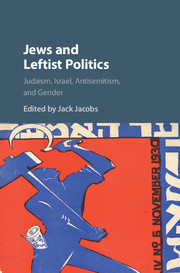Book contents
- Frontmatter
- Contents
- List of Contributors
- Acknowledgments
- Introduction
- PART ONE POLITICAL IMPLICATIONS OF JUDAISM
- 1 The Strangeness of Jewish Leftism
- PART TWO ANTISEMITISM AND THE LEFT
- PART THREE ISRAEL, ZIONISM, AND THE LEFT
- PART FOUR JEWS AND COMMUNISM
- PART FIVE GENDERED PERSPECTIVES
- PART SIX CANONICAL FIGURES
- PART SEVEN CASE STUDIES
- Glossary
- Index
1 - The Strangeness of Jewish Leftism
from PART ONE - POLITICAL IMPLICATIONS OF JUDAISM
Published online by Cambridge University Press: 13 April 2017
- Frontmatter
- Contents
- List of Contributors
- Acknowledgments
- Introduction
- PART ONE POLITICAL IMPLICATIONS OF JUDAISM
- 1 The Strangeness of Jewish Leftism
- PART TWO ANTISEMITISM AND THE LEFT
- PART THREE ISRAEL, ZIONISM, AND THE LEFT
- PART FOUR JEWS AND COMMUNISM
- PART FIVE GENDERED PERSPECTIVES
- PART SIX CANONICAL FIGURES
- PART SEVEN CASE STUDIES
- Glossary
- Index
Summary
I have tried to think about what a keynote address should be like, and in line with my sense of what is appropriate here, I will talk about a subject that occurs first in the story of Jewish leftism, both logically and chronologically. My subject is the difficult, problematic relation of Jewish leftism to the religion of the Jews. We (leftists) started from the religious world – there was no other place – and it was not an easy start.
Many people have pretended that it was easy; they try to find reasons for the Jewish predilection for left politics in Judaism itself: Pesach as a celebration of national liberation, Hanukka as a celebration of religious freedom, the prophets as social critics and advocates of social justice, tzedakah as a commitment to the most vulnerable members of society. There is something to say in favor of this view of our religion, but not enough to explain Jewish leftism. Certainly the holidays, in their Orthodox versions, carry a message very different from the one we were taught in Reform and liberal–left households: Pesach celebrates a liberation at the hand of God and God alone; the people of Israel did nothing to free themselves; this was a liberation without human agency, which is the absolutely essential feature of any left politics (of any politics, actually). And the leaders of the Maccabean revolt were religious zealots; they were opposed indeed to the imposition of an imperial, Hellenistic religion; they fought for the freedom to impose their own orthodoxy on their own people; they were closer in spirit, I dare say, to the Taliban than to the Labor Zionists. The prophets, in the texts we love to quote, were magnificent social critics and advocates of social justice, but there are many texts that we do not love to quote. And the practice of tzedakah in the old kehillot, which certainly made for a kind of welfarism, did not interfere at all with the oligarchies that ruled in each kahal. In fact, traditional Judaism offers precious little support to a left political orientation.
Hence the strangeness of Jewish leftism, for which centuries of religious life did not prepare us.
- Type
- Chapter
- Information
- Jews and Leftist PoliticsJudaism, Israel, Antisemitism, and Gender, pp. 29 - 40Publisher: Cambridge University PressPrint publication year: 2017

